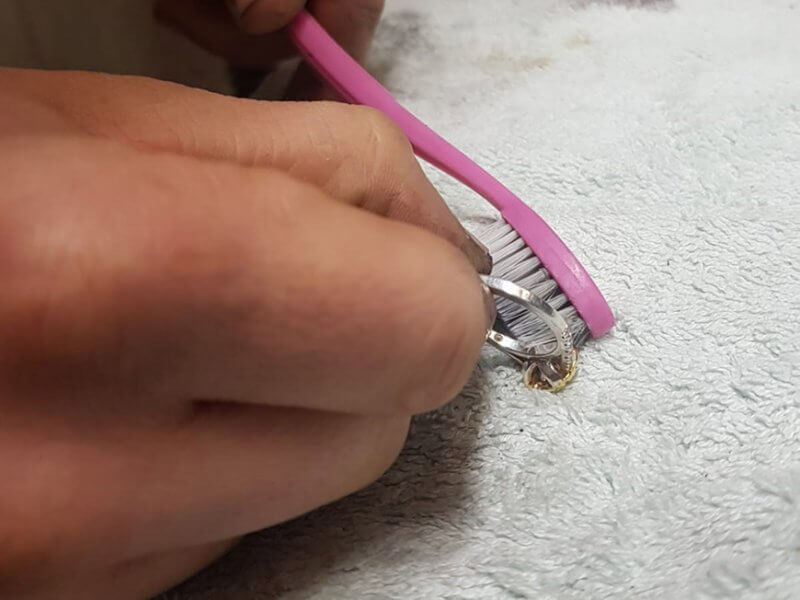How to Take Care of Your Engagement Ring
People often ask me the best way to care for their engagement ring. The answer to this is two-fold. Not only should there be the correct care, but also the correct purchase in the first place.
How to choose the correct engagement ring
An engagement ring should be purchased with your everyday activities in mind. If you are buying an engagement ring and you have a particularly active lifestyle, choose one that will fit the requirements.
Platinum & Diamonds is the hardest wearing of combinations. This is followed by Platinum and a Sapphire or Ruby. This type of jewellery would be suitable for most or what day to day life throws at us, but the above is certainly NOT invincible.
Softer stones like Emerald or Aqua should be treated with utmost care, and stones like Opal or Pearl should be avoided entirely for day to day wearing.
Recommended Don’ts
- It is my recommendation that no rings whatsoever are worn if you are doing any sort of
- heavy handwork,
- washing up,
- gardening
- and especially at the gym.
- Exerting force on any area of a ring can cause bending , which can loosen or crack stones, even diamonds.
- Showering and swimming poses few risks for harder wearing jewellery, but anything made from Sterling Silver should be avoided in high chlorine areas like Child’s swimming pools or Hot – Tubs, as they can turn black…
- If you wear rings on both hands, then clapping should also be avoided. Believe me, I have seen a diamond full eternity ring completely ruined (and become an insurance write-off) after an evening’s clapping at the Royal Albert Hall. This was due to the huge force being ‘hammered’ by one ring onto the stones of the other.
Have your engagement ring regularly checked
But now we have established what not to do or buy, it important to mention how to care for what we do have.
Firstly, get a jeweller to check out your jewellery, especially rings, at least every 2 years. And get the most valuable items insured. An engagement ring can be one’s third-biggest life purchase after a House and a car, and none of us would entertain not having those two uninsured, or unchecked.
The untrained eye can miss cracks in metal or loose stones, in the same way that most of us would have no idea critical parts of our cars were in need of attention, unless a professional checks it over.
I have heard people say they don’t get their jewellery checked out as it’s expensive to do so. Indeed chain store jewellers may charge, but if you invest wisely in buying from your local independent jeweller and building up a relationship with them, my guess is they would take a look for free…
Cleaning an engagement ring
Finally. Cleaning. This is where I have heard all sorts of fascinating stories! Please do not use any alcoholic beverage like Gin or Vodka to clean your jewellery. Or waste your money on any supermarket bought tubs of cleaner. They may look good momentarily, but they can leave a sticky residue and attract more dirt back.
My advice for cleaning any Diamond / Sapphire / Ruby item made from Gold / Platinum would be this:
- Take a kitchen jug, and fill with ‘off the boil’ water and a squirt of washing up liquid.
- Place the jewellery in the jug, along with an old toothbrush, bristles down in the water.
- Allow to soak and cool, and then dab away at the item and underside with the softened bristle toothbrush
- Rinse in a bowl, just in case a stone becomes dislodged. Hunting for it down the sink is hard work, believe me!
If your jewellery is a softer stone, like Aquamarine or Emerald do the same procedure as above BUT make sure the water is warm and not hot, and only rinse in water the same temperature. Never subject a soft stone to sudden temperature changes.
Anything softer, like Pearl or Opal or Turquoise should be treated even more carefully, and minimal contact with anything abrasive / chemical should be avoided all together.
Please contact us on 01444 471380 to discuss any of your engagement care requirements
FAQs
Q: Diamonds are unbreakable, right?
A: Not all, sadly. They are, indeed, the hardest of gemstones, but they still can chip or break. If you accidentally caught the diamond in a ring on a hard surface, it would not be unheard of for the stone to crack in two in the worst cases.
Q: Why has my silver engagement ring turned black?
A: Chlorine (as in swimming pools) can cause this. Avoid exposure to this as much as possible
Q: My white gold engagement ring is turning yellow. How can I get the colour back?
A: This is not a case of cleaning or tarnish. The yellow tinge is the natural colour of white gold and the reason it’s becoming visible is the Rhodium Plating is wearing away. Please see our Blog post ‘Rhodium Plating White Gold’.
Q: My platinum engagement ring is showing signs of denting. Is there something wrong with it? I thought is was a hard metal?
A: Indeed Platinum is the hardest of the Precious metals, but it’s still softer than everyday objects we handle like steel door handles, car gear sticks etc. Sadly, all metals will dent and scratch.
Q: I have been told to leave my engagement ring in Coca-Cola to clean it. It seems to work, so is it OK?
A: Cola cleans lower carats of gold due to the acidity in the drink removing the tarnish, but it’s not ideal. Just ask your jeweller to re-apply the coating

